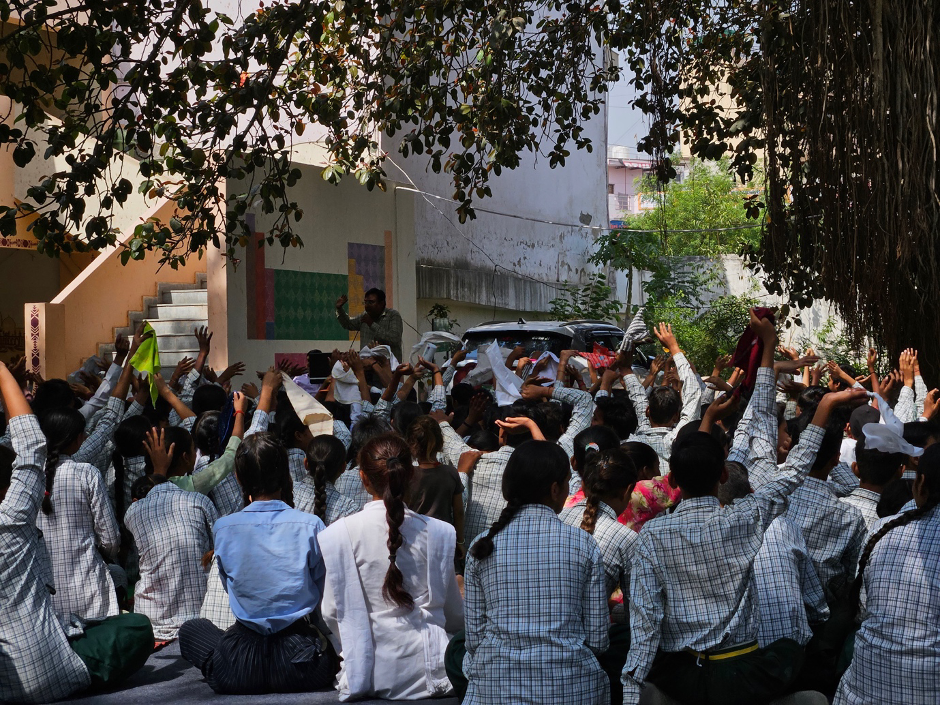Meet the precariat, the new global class fuelling the rise of populism

Unstable and underpaid, the precariat are already influencing politics Image: REUTERS/Laurent Dubrule
We are in the middle of a global transformation, the painful construction of a global market economy. In the initial period dominated by financiers and rent-seekers, a new global class has taken shape: the precariat.
The transformation started in the 1980s, with a vision of open liberalized markets. Less noticeable was the strategy of dismantling institutions of social solidarity; they stood against the market. That weakened labour’s bargaining power.
Crucially, the integration of China and other emerging economies into the world’s labour market added 2 billion workers to the global supply, most of them used to earning one-fiftieth of what OECD workers received. As productivity could rise faster in emerging market economies, there has since been downward pressure on wages in all OECD countries.
This was intensified by labour flexibility policies and the silicon revolution that facilitated the relocation of production and employment to where costs were lowest. All this shaped a global class structure superimposed on old national structures.
A new class system

At the top are a plutocracy and an elite, earning rentier incomes and wielding enormous political power. Way below them, in income terms, is a salariat, a shrinking group with employment security and an extensive array of non-wage enterprise benefits such as pensions, paid holidays and medical leave. Alongside them in income terms is a growing group of proficians, not seeking employment security but frenetically making money, endangered by burn out.
Next comes the old core of the working class, the proletariat, for whom the unions worked and for whom welfare states were built. The norm was stable full-time labour, with entitlements tied to performance of labour. Shrinking everywhere, there is no reason to wish to revive a society in which this way of living is the norm.
Below it in income terms, the precariat is growing. It is not an under-class; global capitalism wants a workforce with its core characteristics. It can be defined in three dimensions. First, it has distinctive relations of production. Commentators have emphasized the first aspect, some claiming that the precariat is not a new class because there has always been unstable labour. But while it is true that the precariat is being pressured to accept unstable labour, this is the least interesting feature.
Out of control of time
Of course, there is more involuntary part-time labour, short-term contracts, zero-hours contracts, internships and the concierge economy associated with Uber, Deliveroo and sundry other platforms, including crowd labour. But more significantly, the precariat has no occupational identity or narrative to give to their lives. This creates existential insecurity, and goes with the fact that for the first time in history many people have education above the level of labour they can expect to obtain.
Another unique feature is that the precariat must do much work-for-labour that is neither recognized nor remunerated. So, the precariat is exploited off workplaces and outside labour time as well as on workplaces and in labour time. Since my book The Precariat was first published, I have received numerous emails from around the world from people in this group of people, and this is mentioned more than anything else. It leads to what I call the “precariatized” mind, a feeling of being out of control of time.
The precariat’s second dimension is distinctive relations of distribution, its structure of social income. It relies largely on money wages, without non-wage benefits, rights-based state benefits or informal community benefits. But its real wages have been falling, in a context in which average real wages have stagnated for the past three decades in the United States, France, Germany, the United Kingdom and other OECD countries. And wages are increasingly volatile, with declining prospects of upward mobility and increasing risks of downward.
__________________
Have you read?
Four changes shaping the labour market
Has Europe's financial crisis pushed voters to the right?
What's wrong with the world's labour markets?
__________________
In addition, the precariat lives in debt, which is a systemic form of rental extraction. With volatile uncertain earnings, they are constantly on the edge of unsustainable debt. This means, among other things, that net income is well below gross income. Conventional income statistics understate inequality.
Then, the precariat faces deepening poverty traps, as governments have moved to means-testing, conditional social assistance and workfare. If you are in the precariat and become unemployed, and manage to obtain benefits, you face a marginal tax rate of over 80% in taking the sort of low-wage job you are likely to be offered. It may be over 100%. Then you are called rude names if you decline to take such jobs. No member of the salariat would get out of bed if faced by such tax rates, except perhaps to take to the streets to protest. But that is what politicians have forced on the precariat.
The precariat also face precarity traps. For instance, there are often long delays between someone becoming eligible to receive benefits and starting to receive them. It would be folly for someone who has just managed to do so to take a short-term job. Not only would they face that high marginal tax rate but they would also face the prospect of having to apply and wait all over again. Calculated over a few months, they would be worse off taking such jobs. How unfair. Another precarity trap arises from the fact that often someone can lower their long-term earnings by taking a job below their competence or outside their profession. Yet that is what governments are forcing the unemployed to do.
In sum, the precariat lives in economic uncertainty, usually in chronic unsustainable debt, in which one shock, mistaken decision or illness could tip them over the edge into the under-class, cut adrift from society and probably condemned to social illness or an early death.
Walking on moving sand
The third dimension is having distinctive relations to the state. The precariat is the first class in history to be losing acquired rights – cultural, civil, social, economic and political. This is documented in A Precariat Charter. It leads to the most crucial feature. Those in it are reduced to being supplicants. The Latin root of precariousness is “to obtain by prayer”. The precariat must ask for favours, for charity, to show obsequiousness, to plead with figures of authority. It is degrading and stigmatizing.
So much for defining features. Yet everywhere the precariat is split into three factions, each suffering from feelings of relative deprivation, with respect to others and to time.
1. The first faction consists of those who have fallen from old working-class communities or families. They feel they do not have what their parents or peers had. They may be called atavists, since they look backwards, feeling deprived of a real or imagined past. Not having much education, they listen to populist sirens who play on their fears and blame “the other” – migrants, refugees, foreigners, or some other group easily demonized. The atavists supported Brexit and have flocked to the far right everywhere. They will continue to go that way until a new progressive politics reaches out to them.
2. The second group are nostalgics. These consist of migrants and beleaguered minorities, who feel deprived of a present time, a home, a belonging. Recognizing their supplicant status, mostly they keep their heads down politically. But occasionally the pressures become too great and they explode in days of rage. It would be churlish to blame them.
3. The third faction is what I call progressives, since they feel deprived of a lost future. It consists of people who go to college, promised by their parents, teachers and politicians that this will grant them a career. They soon realize they were sold a lottery ticket and come out without a future and with plenty of debt. This faction is dangerous in a more positive way. They are unlikely to support populists. But they also reject old conservative or social democratic political parties. Intuitively, they are looking for a new politics of paradise, which they do not see in the old political spectrum or in such bodies as trade unions.
For a while, the progressives opted out of mainstream politics, reflected in declining voter turnouts and so on. However, this has been changing since 2011, albeit not by enough to stop the UK voting to leave the European Union and the US from electing Donald Trump. They have begun to define the future again, drawing energy from the need to revive the great trinity of the Enlightenment – liberté, egalité and fraternité.
It is messy out there, but there is a lot of energy. It is time for politicians and the international community to respond, or to step aside and let others do so.
This is the first of a three-part series exploring the effects of global capitalism on modern workers by Guy Standing, author of The Precariat. You can read the second installment, a debunking of the cornerstones of free-market capitalism, here.
Don't miss any update on this topic
Create a free account and access your personalized content collection with our latest publications and analyses.
License and Republishing
World Economic Forum articles may be republished in accordance with the Creative Commons Attribution-NonCommercial-NoDerivatives 4.0 International Public License, and in accordance with our Terms of Use.
The views expressed in this article are those of the author alone and not the World Economic Forum.
Stay up to date:
Youth Perspectives
Related topics:
Forum Stories newsletter
Bringing you weekly curated insights and analysis on the global issues that matter.
More on Youth PerspectivesSee all
Christie Burley and Inés Yábar
November 5, 2025







